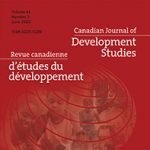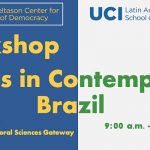Authoritarianism, Populism, Nationalism and Resistance in the Agrarian South
Dr. Oliveira’s article “Authoritarianism, Populism, Nationalism and Resistance in the Agrarian South” has just been published as the guest editor’s introduction to a special issue the Canadian Journal of Development Studies.
The article is co-authored with Ben McKay and Juan Liu, who also co-edited the special issue.
ABSTRACT: This special section contributes to the vibrant debates concerning the “new political moment” underway with regards to “authoritarian populism” and nationalism in the agrarian South. With neoliberal globalisation in crisis, nationalist-populist and authoritarian movements are gaining ground, often transforming state and class configurations in ways that appease landed, agro-industrial and political elites, while simultaneously seeking to neutralise forms of resistance. Rather than starting from an ambiguous concept that submerges these class conflicts and contradictions, we argue that re-centering class struggles that frame the new political moment offers a more useful framework for understanding agrarian transformation in the contemporary period.
KEYWORDS: Authoritarianism, populism, nationalism, resistance, agrarian change
The Canadian Journal of Development Studies is a peer-reviewed, interdisciplinary, bilingual (English and French) forum for critical research and reflection on the complex problems of international development theory, policy and practice. Founded in 1980, the CJDS remains the only Canadian scholarly journal devoted exclusively to the study of international development. It is published quarterly by the Canadian Association for the Study of International Development.
For the full-length article, see: https://www.tandfonline.com/doi/full/10.1080/02255189.2020.1814707




